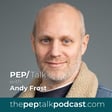
With Ruth Jackson
What are the issues and challenges around young people and faith? Whether we're thinking about peer-to-peer evangelism, parents passing faith to their children, or the impact of growing up in a digital environment, both the opportunities and the pitfalls are immense. Here to offer her insight is Ruth Jackson, speaking with Andy Bannister and stand-in co-host Gavin Matthews.
Ruth Jackson is a producer and youth specialist for Premier Christian Radio’s Unbelievable? programme and podcast, which brings Christians and non-Christians together for dialogue. She was previously editor of Premier Youth and Children’s Work magazine. Ruth studied theology at Oxford University before working at the BBC’s flagship children’s television show Blue Peter. She moved to Ravi Zacharias International Ministries, where she helped set up the youth apologetics strand Reboot. Ruth is a volunteer youth worker, preacher and worship leader at her local church in Feltham, where she lives with her musician husband Will and puppy Taylor.



















